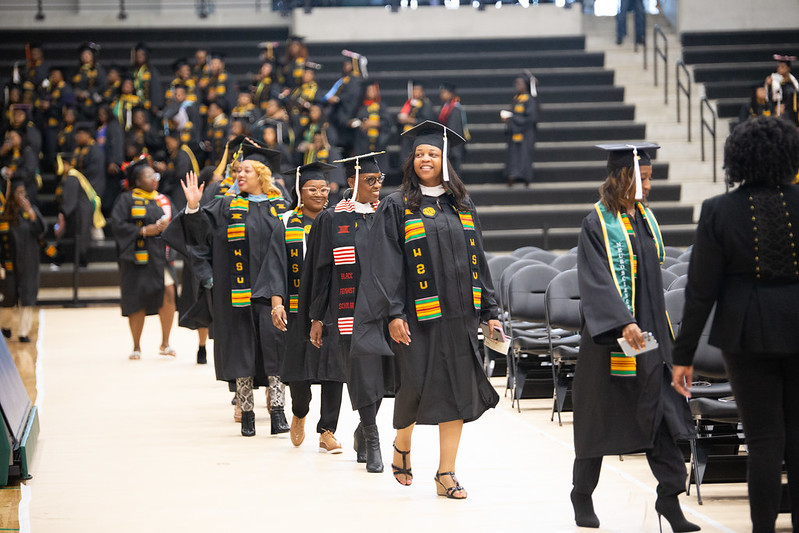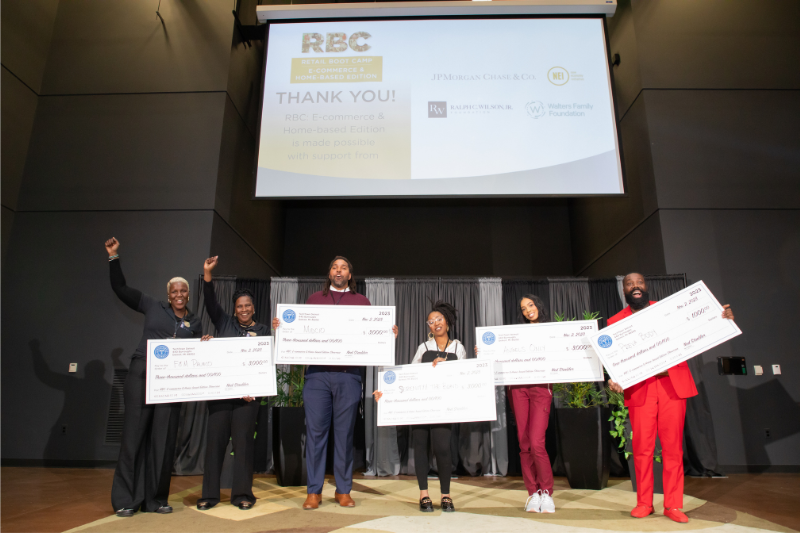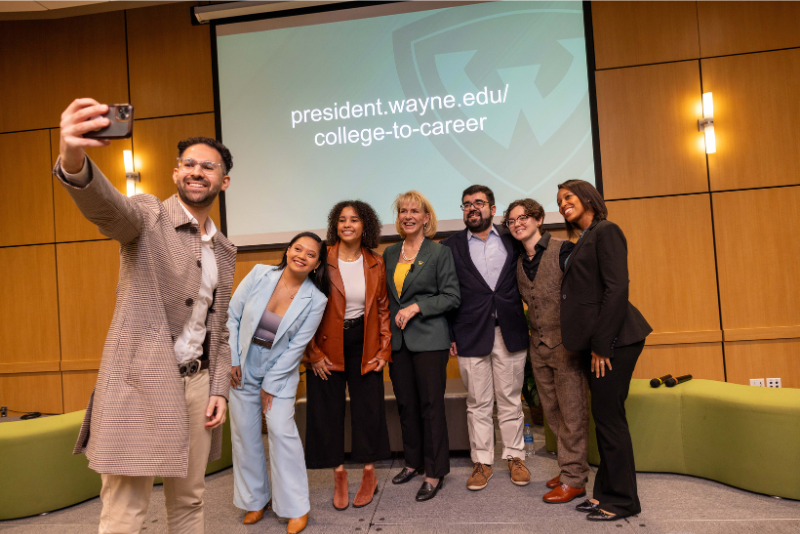Wayne State reflects on Detroit Future City's updated economic equity indicators
Detroit Future City (DFC) a think tank, policy advocate and an innovation engine dedicated to creating a more equitable and sustainable future for Detroit, recently released the first update to its online Economic Equity Dashboard. The dashboard consists of 22 indicators across six focus areas, pulled from the nonprofit’s State of Economic Equity In Detroit report published in May 2021.

Wayne State University's Economic Impact Strategy is heavily influenced by Detroit Future City's State of Economy in Detroit Report, released in 2021.
DFC’s report heavily influenced Wayne State University’s own Economic Impact Strategy. Introduced by the Office of Economic Development in 2022, following the release of the university’s 2022-2027 strategic plan, the economic impact strategy is inclusive of work happening across schools, colleges and divisions.
Both DFC’s State of Economic Equity In Detroit report and Wayne State’s Economic Impact Strategy lay out a vision for an economically equitable Detroit, which DFC defines as one in which “all Detroiters are meeting their unique needs, prosperity, and fully and fairly participating in all aspects of economic life within a thriving city and region.”
Through its economic impact strategy, Wayne State “envisions and commits to contributing to an increasingly vibrant Detroit — and Michigan — with equitable access to opportunity and lasting prosperity for all.”
A shared vision for equitable economic prosperity
Three of the university’s five economic impact goals center around creating, providing and connecting Wayne State’s students and employees — and Detroiters more broadly — to good, household-supporting jobs. Wayne State aligns with the State of Economic Equity In Detroit report in its definition of a household-supporting job, as one that allows an individual to meet their unique needs and build wealth. The university’s Economic Impact Strategy also refers to Detroit Future City’s median wages for individuals with and without a college degree as starting points for discussion ($32/hour with a college degree versus $17/hour without a college degree).
Through its Economic Impact Strategy, Wayne State seeks to move the needle on external metrics, such as the percentage of individuals with a post-secondary credential or degree in Detroit and Michigan, labor force participation rates and the percentage of individuals earning above Detroit Future City median wages. The university also seeks to decrease racial and geographic gaps, including those between Black and white Detroiters and Detroit and the region.

Students at Wayne State's Black Graduation Celebration of Excellence in April.
“The State of Economic Equity in Detroit was a kind of a call to action to our city and region,” says Emily Thompson, director of economic and community development at Wayne State. “Wayne State answered that call, becoming one of the first institutions to respond directly to the report with concrete actions. The dashboard update helps understand the progress that has been made in recent years and the need that still exists.”
Putting our plans to action
The dashboard release came shortly after Detroit Future City’s 2023 Equity Forum on Thursday, Nov. 2. The sold-out event brought together stakeholders from across Detroit and the region to explore the intersections between sustainability, economic equity and community and economic development, to explore a vision for and inspire action towards a thriving Detroit. Wayne State and TechTown Detroit sponsored the forum.
Founded in part by Wayne State in 2000, TechTown is the university’s nonprofit business service organization and is a great example of how Wayne State is working to create household-supporting jobs and wealth-building opportunities — especially for Detroiters and people of color.

Several cohort graduates of TechTown Detroit's Retail Boot Camp: E-commerce & Home-based Edition received cash prizes during the RBC: E-Commerce & Home-based Edition Showcase, which took place at the Wayne State Industry Innovation Center in early November. This program supports entrerpreneurs with e-commerce, pop-up and home-based businesses. Photograph by J Lindsey Photography
Since 2007, TechTown clients and alumni of Wayne State’s Goldman Sachs 10,000 Small Businesses have together raised $406 million in startup and growth capital and created 14,277 jobs. This year so far, TechTown has supported 851 entrepreneurs, 84% of whom are people of color.
Access to capital for small businesses is one of the 22 indicators that make up the Economic Equity Dashboard and one that saw significant improvement. From 2019 to 2021, according to Detroit Future City, Detroit experienced a 41% increase in the amount of small business capital, per job available.
Creating a brighter future through student success
Other indicators from DFC’s Economic Equity Dashboard include educational attainment and median household income. “The share of Detroiters with a bachelor’s degree remains low when compared to the region and other cities across the county,” stated in The State of Economic Equity in Detroit report. Racial disparities in both educational attainment and income also persisted.
Wayne State has been a leader in regional and statewide efforts to expand college access and boost student success. The university introduced the Wayne State Guarantee, Michigan’s largest tuition pledge program, in 2023. Eligible students for this financial aid program incur zero out-of-pocket expenses. It joins such groundbreaking programs as the Heart of Detroit Tuition Pledge, which offers free tuition for students who graduate from Detroit high schools or Detroit residents earning a high school diploma, and Warrior Way Back, the only program of its kind in Michigan, which provides debt forgiveness as returning students earn their degree.

Several Wayne State students and alumni participated in a panel with President Espy during her first major address in early November. Here, those students and alumni take a selfie with her. Photograph by United Photo Works
Earlier in November, during Wayne State University President Kimberly Andrew Espy, Ph.D.’s first major address, she announced the new College to Career initiative. This program will work to ensure students graduate career ready and prepared to thrive in their respective workplaces. This will be encouraged through “learning by doing experiences,” including field work, internships, micro-externships, alumni and professional mentoring, and more.
"In my first 100 days, I’m more convinced than ever that each of our students deserves the very best from us. They worked so hard to get to Wayne State’s open doors,” Dr. Espy said during the address. “At Wayne State then, these talents are honed even further through engagement with our faculty and supportive staff; talents that then can be deployed when they graduate, launch their careers and pursue an even brighter future. This is how our graduates reflect Wayne State’s tangible and enduring impact on this place and on the lives of so many others to come.”
These student success initiatives, paired with our work through our Economic Impact Strategy and entrepreneurship programs, are the keys to ensuring the equitable economic impact the university is working towards, not only through 2027 but for many years to come.